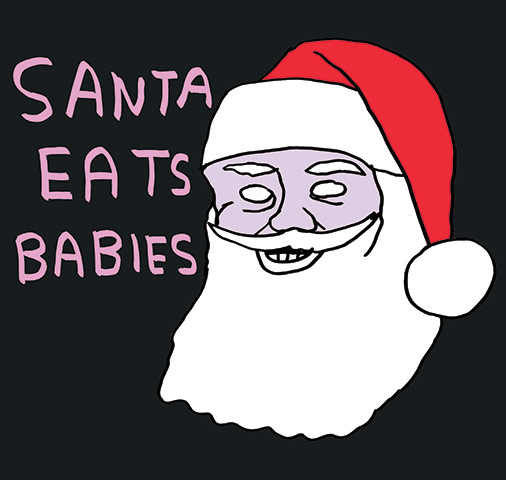Every year as we approach the holiday that celebrates the birth of God — the birth of God — I get a little depressed. Cause, you know, we killed him. How do you enjoy Christmas when you know the story ends pretty horribly for baby Jesus?
Even if you don’t believe in God, even if you don’t consider yourself a fan of Christ or a Christian, you’ve got to be a little taken aback by this holiday called Christmas, which celebrates the birth of humanity’s redeemer.
We crucified the guy 2,000 years ago and every day we continue to kill him by focusing on everything ungodly: greed, gluttony, stress, overwork, sports game losses, spelling bee mistakes, not to mention all the damn potholes in the roads.

And the divinity deaths don’t end there. More recently, about 125 years ago, we killed Jesus’s heavenly father, God. According to Friedrich Nietzsche:
God is dead. God remains dead. And we have killed him. How shall we comfort ourselves, the murderers of all murderers? What was holiest and mightiest of all that the world has yet owned has bled to death under our knives: who will wipe this blood off us? What water is there for us to clean ourselves? What festivals of atonement, what sacred games shall we have to invent? Is not the greatness of this deed too great for us? Must we ourselves not become gods simply to appear worthy of it?
God didn’t die literally, of course, but in a moral sense. Humans had evolved beyond the need for God, for the need of a universal truth and grand creator. And now something had to fill that void, and to Nietzsche that was man himself.
But has humanity actually evolved beyond God? A recent essay from The Stone highlights that most Americans continue to practice Christianity (as does their current president and indeed every US president ever). They seem to still need God to fill some void that they feel:
Perhaps Nietzsche was wrong about how long it would take for the news of God’s death to reach the ears of men. Perhaps he was wrong, in other words, about how long it would take before the happiness to which we can imagine aspiring would no longer need to aim at universal validity in order for us to feel satisfied by it.
I agree with Nietzsche that mainstream Western culture today has moved beyond God. I disagree that humanity can possibly fill the void. I’m fairly convinced that any man or woman will likely fall far short. (Case Point 1: Barack Obama. Case Point 2: LeBron James.)
The question remains: What fills the God gap? The Stone suggests looking to Herman Melville for an answer:
Writing 30 years before Nietzsche, in his great novel “Moby Dick,” the canonical American author encourages us to “lower the conceit of attainable felicity”; to find happiness and meaning, in other words, not in some universal religious account of the order of the universe that holds for everyone at all times, but rather in the local and small-scale commitments that animate a life well-lived. The meaning that one finds in a life dedicated to “the wife, the heart, the bed, the table, the saddle, the fire-side, the country,” these are genuine meanings. The death of God therefore, in Melville’s inspiring picture, leads not to a culture overtaken by meaninglessness but to a culture directed by a rich sense for many new possible and incommensurate meanings.
I love Melville’s words there: “the wife, the heart, the bed, the table, the saddle, the fire-side, the country.” God may be dead. What are we left with? Lots, thankfully. Lots of simple things to fill the void, especially during Advent: the smell of a pine tree in your living room; baking cookies and eating your coworker’s better-tasting Christmas cookies; the joy of giving gifts; the first snow; Bing Crosby’s crooning; Charlie Brown’s drooping Christmas tree; family gatherings lubricated with rum-laced egg nog; fireplaces; lights hung on trees and outside homes, and the tackier the better.
God is dead. Many gods are alive. Let’s celebrate a few of them at Christmastime.
